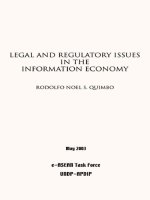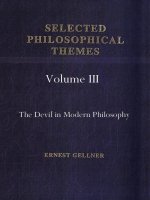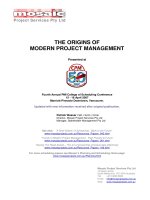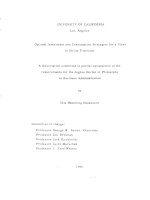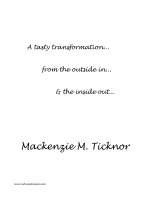The Devil in Modern Philosophy
Bạn đang xem bản rút gọn của tài liệu. Xem và tải ngay bản đầy đủ của tài liệu tại đây (1.28 MB, 268 trang )
SELECTED PHILOSOPHICAL THEMES
SELECTED PHILOSOPHICAL THEMES,
VOLUMES I–III
VOLUME I
Cause and Meaning in the Social Sciences
VOLUME II
Contemporary Thought and Politics
VOLUME III
The Devil in Modern Philosophy
SELECTED
PHILOSOPHICAL THEMES
Volume III
The Devil in Modern Philosophy
Ernest Gellner
LONDON AND NEW YORK
First published 1974 by Routledge & Kegan Paul Ltd.
This edition published 2003
by Routledge
11 New Fetter Lane, London EC4P 4EE
Simultaneously published in the USA and Canada
by Routledge
29 West 35th Street, New York, NY 10001
Routledge is an imprint of the Taylor & Francis Group
This edition published in the Taylor & Francis e-Library, 2005.
“To purchase your own copy of this or any of Taylor & Francis or Routledge’s collection
of thousands of eBooks please go to www.eBookstore.tandf.co.uk.”
© 1974 Ernest Gellner
All rights reserved. No part of this book may be reprinted or reproduced or
utilised in any form or by any electronic, mechanical, or other means, now
known or hereafter invented, including photocopying and recording, or in
any information storage or retrieval system, without permission in writing
from the publishers.
British Library Cataloguing in Publication Data
A catalogue record for this book is available from the British Library
Library of Congress Cataloging in Publication Data
ISBN 0-203-01135-X Master e-book ISBN
ISBN 0-415-30295-1 (set)
ISBN 0-415-30298-6 (volume III)
Contents
Preface vii
Acknowledgments ix
Part one Philosophy in general
1 The devil in modern philosophy 2
2 The crisis in the humanities and the mainstream
of philosophy
8
3 Reflections on philosophy, especially in
America
39
4 On being wrong 47
5 Is belief really necessary? 54
Part two On ethics
6 Maxims 67
7 Ethics and logic 78
8 Knowing how and validity 94
9 Morality and ‘je ne sais quoi’ concepts 104
Part three Some ancestors
10 French eighteenth-century materialism 112
Part four Philosophy in particular
11 Thought and time, or the reluctaut relativist 150
12 Poker player 165
13 Ayer’s epistle to the Russians 171
14 Ayer on Moore and Russell 184
15 The belief machine 193
Part five Psychologists and others
16 The ascent of life 199
17 Man’s picture of his world 204
18 On Freud and Reich 209
19 A genetic psychologist’s confessions 214
20 Eysenck: seeing emperors naked 219
21 On Chomsky 223
Sources 231
Bibliography of Ernest Gellner 232
Index of names 242
Index of subjects 245
vi
Preface
Ernest Gellner became a philosopher at a bad time: the dominant stream of
philosophy in this country—‘Oxford’ philosophy or ‘linguistic’ philosophy—
was boring. Not only was it boring—indeed it made a virtue of being boring—
it was pointless. Not only was it pointless—indeed it made a virtue of being
pointless—it was self-serving. It even made a virtue of being self-serving.
Anyone interested in Gellner and his philosophical ideas has to take these as
premisses. Although Gellner has long since become a professionally qualified
and published anthropologist; although he teaches in a sociology department and
doubtless thinks of himself as something of a sociologist (perhaps an amateur but
no dilettante); he remains above all a philosopher. The problems which
preoccupy him, the things he has to say, are directly philosophical.
Coming of age at a time when philosophy was supposed to naturally have no
problems, or at worst to have had them and to be engaged in making them go
away (dissolve); at a time when philosophers were not supposed to be so vulgar
as to have something to say about these problems (as opposed to something to
do); at such a time a genuine philosopher had to break out to breathe. This
aspect of Gellner’s career, which brought him his original fame (for some,
notoriety for others), the struggle for the freedom to philosophize, is hardly
touched upon in this volume. We have rigorously excluded papers that were
precursors of, or spin-offs from, his devastating act of breaking out, Words and
Things (1959). Doubtless, when Ph.D. theses are written about the dispute over
Oxford linguistic philosophy in Britain in the 1950s, these papers will be
anthologized—by others. Our purpose, in collecting papers spread over twenty
years of philosophical reflection, is to show how Gellner’s break-out was not
just that. It led him to conclude that philosophical movements and fashions
could not be adequately explained solely by philosophical means. This in turn
led him into explorations of English intellectual culture, with a critical
detachment and insight all the more remarkable because in this case the
anthropologist is a member of the tribe.
Gellner’s systematic philosophy, if he has one, is also not expounded here.
Again, the books Thought and Change (1965) and The Legitimation of Belief (1974)
speak for themselves. What is to be found here are chapters on specific
philosophical problems, and others on specific people with interesting
philosophical ideas (not all of them philosophers). Despite wide differences on
many matters, on one very profound point about philosophy Popper and
Gellner are at one against Oxford linguistic philosophy: for both of them,
philosophy is not a detached and free-floating activity for specialists; it cannot be
separated out from people’s common-or-garden beliefs and day-to-day lives.
Everyone has, however implicit, attitudes towards the basic philosophical quests
of man, regarding his place in nature and society, regarding the meaning of life
and of history. Philosophy is being critical about these questions, and proposing
new solutions to them. Gellner is a philosopher who tries to contribute to this
ambitious and magnificent tradition. And, in that tradition, each formulation,
each statement, each view, is just another approximation, another speech in the
continuing dialogue. Appropriately enough, the volume ends with the author’s
homage to another ambitious thinker, Noam Chomsky, in whom he senses a
similar quest and to whom he looks hopefully for further enlightenment.
I.C.J.
J.A.
viii
Acknowledgments
The editors met Ernest Gellner in the 1950s at the London School of Economics
when they were students, whom he treated as colleagues. Their appreciation of
his work has grown since then, and they were glad to receive permission to edit
his work. The editors wish to thank the publishers and editors of the different
papers here republished. They take joint and equal responsibility for the
selection, arrangement, and preface. Most of the technical work in preparing
the volume for the press and seeing it through to publication was done by
Jarvie, who wishes to thank his research assistant, Mr Michael Burchak. Agassi
takes the blame for the flamboyant subject index.
York University, Toronto I.C.J.
Boston University and Tel Aviv University J.A.
Part one
Philosophy in general
Chapter 1
The devil in modern philosophy
Modern philosophy, from Descartes onwards and including the present
generation of philosophers, can be defined as belief in the devil. What gives post-
Cartesian philosophy unity is the daemon. Descartes invented him, but all the
others believe in him.
Why and how did Descartes invent him? As is well known, Descartes,
surveying the chaos of past errors, and noticing that even the greatest
absurdities were believed by someone, hoped that reason could lift itself by its
own bootstraps and liberate itself from all possible error. But to do that one had
to start from scratch. Now, if you want to start from scratch the main difficulty
is to find the scratch; to find that firm point from which the totally new but safe
departure is to be made. This is where the assumption of the devil comes in.
Assume an evil-minded and all-powerful devil whose aim is to frustrate you, and
above all to frustrate you in attempts to know anything about the world.
Now try, just try really seriously to make this assumption and see which of
your convictions stand up to it: very few, if any. Still, there might be some
convictions that survived. There may be some convictions which even on the
assumption of the malignant daemon who interferes with us, must still remain
indubitably true. If indeed there are such, then they constitute the scratch. They
must be the bedrock, the firm and truly reliable base, the foundation of a new
edifice. Now just this was the function in Descartes of the assumption of the
devil: to use it as an acid test, as a means of isolating that which is really certain,
from that which only appears so. Note that for this it is quite unnecessary for
the devil really to exist; only the assumption, not the reality, is required. And as
a matter of historical fact, Descartes did not believe in his existence. On the
contrary, he believed that the truth of rigorous thinking was underwritten by a
benevolent God.
The particular firm base that Descartes managed to locate by his device is
well known: I think, therefore I am. I may doubt everything, but the doubt
itself is a case of thinking, and therefore I exist. Whatever can be doubted,
whatever may be suspect as a possible front of the devil, one’s own existence
cannot. This argument can be interpreted in (at least) three ways: as what
contemporary philosophers would call a pragmatic paradox, as hinging on the
fact that the occurrence of a doubt is itself an instance of thinking, and hence the
existence of thought is proved by the very doubt itself. Or it can be interpreted
as an argument from the certainty and indubitability of the immediate data of
consciousness. Or again, it may be interpreted as the argument that an activity
entails an agent, a manifestation entails a substance of which it is the
manifestation. Whichever of these interpretations we adopt, the arguments
conveyed have interesting subsequent histories. Just what Descartes did with his
bedrock when he found it doesn’t concern us now.
For most philosophers after Descartes, the devil was far from fictitious. They
did not assume his existence, whilst remaining quite confident that he did not
exist. No, on the contrary, they firmly believe that he exists. Subsequent
philosophers can be classified according to how they identified him.
The first theory was that the devil was our own mind. It was our own mind
which organized the systematic misrepresentation which Descartes feared but
did not really think went on. It is our own mind which makes us believe in the
existence of things which are not truly there, or obscures the existence of those
which are. There are many variations on this theme. For instance, it may be
held that our mind misleads us by trusting the senses too much; but it has also
been supposed that it misleads us through indulgence in abstract thought.
The second major theory is that the devil is history. This theory grew very
naturally from the earlier identification of the daemon with mind. Thinkers such
as Locke or Hume thought they were carrying out their investigations into the
human understanding, or human nature as such; that by dissecting the mind they
would be able to tell us enough about the habits of this one daemon, so that
anyone anywhere could be forewarned. Not that Hume, for instance, was
unaware of something that we may call cultural relativism; still, basically it was
the same mind everywhere, the same devil.
The transition from identifying the daemon with mind to identifying him
with history came after Kant, and was perhaps implicit in some of his views. If
for Kant truth was still unique, error was not random. Error as much as truth
reflected the structure of the mind (perhaps more so); such basic errors as exist
are external manifestations of something essential in us, and they will for that
very reason tend to appear in certain patterns. The errors that we find on
looking back at the history of thought are not like the random dispersal round
the bull’s eye, a tedious record of trial and error with more error than trial. On
THE DEVIL IN MODERN PHILOSOPHY 3
the contrary, they are more like the figures on the Swiss clock which appear
regularly.
But if error can be deeply revealing and even have a tendency to appear in
certain patterns, then why should not the same hold of truth? Indeed it is only a
small step to such a conclusion. After Kant, it was less often taken for granted
that mind was manifesting itself almost identically in all men. And the source of
systematic error was no longer to be sought in the mechanics of mind but in
history, in the temporal, geographical, social background of knowledge. The
devil who interferes with our apprehension of reality had assumed a new shape.
Historicist daemonologies such as the Marxist or the Spenglerian contain accounts
of how the daemonology is itself exempt from daemonic distortion, or even of
how the daemon himself guarantees its truth.
This historical devil is far from dead today. But whilst the doctrine that man
is a slave of history is still alive and kicking, it is not the dominant one at
present. The ruling daemon at present, at least in this country, is language.
The manner in which the linguistic devil developed out of the historical one
is a subtle business, but there was a logical connection. The development went
something like this. After Darwin, the daemon of history was joined by the
related daemon of nature. Naturalism accompanied or replaced historism.
Under the influence of the advance in biology, theories that the daemon is
nature flourished. Pragmatism is the best known of these. Thinking, valuation,
knowledge were all to be seen as natural processes governed by laws common
to all nature. The tiger’s claw and the giraffe’s neck were, fundamentally, the
same kind of phenomenon as geometrical reasoning, or the ten commandments.
This amounted to handing over thought bound and gagged to nature. Some
philosophers resisted the various isms—psychologism, historism, naturalism—
that is the interpretation of knowledge and truth as the manifestation of this, that
or the other power controlling thought, controlling us altogether. These
philosophers sought refuge from these daemons in logic, and contributed to a
revival of that subject that took place towards the end of the last and the
beginning of this century. The new interest in logic was motivated in part by
this determination to see thought as really true and really false, rather than as a
display of devilish tricks.
Logic profited greatly as a result of the new attention it received, though
philosophy in the end did not. Problems arose even in logic, and in consequence
of investigations into the foundation of logic, it came to be held that logic is not
such an error-impervious strong-hold after all. Logic is rooted in language: and
thus the modern linguistic devil came to be born.
4 THE DEVIL IN MODERN PHILOSOPHY
There is also the quite celebrated psycho-analytic or unconscious daemon,
descended from his mind-devil ancestor via Schopenhauer with an infusion from
the biological member of the family.
I have suggested that types of modern philosophy since Descartes can be seen
as rival identifications of the daemon as the mind, as history, as biological
nature, as the Unconscious mind, as language. This might be called comparative
diabolics. But there is another interesting way of grading modern philosophers
which could be called differential daemonology. At one end of the scale we can
put those who decide to fight, who want to outwit the devil. Having come to
the conclusion that he exists, that there is something systematically interfering
with our pursuit of knowledge, they decide that it is their task to find ways and
means of getting past him (of devising stratagems against him). These are the
philosophers who give us rules of thought, who supply pre-fabricated
methodologies which if carefully followed will act as charms against error; these
philosophers give us formal recipes for what truth or meaning must be like.
They see themselves as a kind of Intelligence Service of knowledge, ferreting
out agents provocateurs amongst us and sending out spies to tell us of the
enemy’s plans.
At the other end of the scale are those who in a way draw the logical
conclusion from the fact that the daemon is all-powerful. If the deceiver is
indeed all-powerful, what point in trying to outwit him? If the deceiver is all-
powerful and systematic, cannot his deceptions be re-named—truth? Can we not
make our submission and have done with it? There has been many such
collaborationists among philosophers. They should hardly be called traitors,
though the charge of trahison des clercs is in part levelled at them. Yet theirs was
not treason, for they argued that their policy must prosper, the enemy being ex
hypothesi all-powerful. Philosophers of this kind do not devise strategies, they
try to smooth the path of occupation by explaining the pointlessness of resisting,
and even of wishing that one could resist. Pointless lament, used roughly in this
sense, became almost a technical term in recent philosophy. (Philosophers of
this kind explain to us, for instance, that it is pointless to wish to know what
things are really like as opposed to what they are like when seen and touched by
us; that it is pointless to wish to know truth other than as conveyed by some
language, and so on.)
Of course, there is no need for every philosopher to be either an all-out
resister or an all-out collaborationist. Many or most of them are dispersed
somewhere along the spectrum separating the two extremes. One may consider
oneself capable of outwitting the daemon in some spheres and not in others.
Thus, for instance, Kant stood somewhere in the middle. His major work, the
THE DEVIL IN MODERN PHILOSOPHY 5
three great Critiques, is essentially a study of the various habits and doings of
the mental daemon. The daemon was held to be invincible to the extent that we
could not do without him, or break his habits, but he was not invincible to the
extent of being able to hide his tricks; at least not after Kant had uncovered
them for us. We had to go on living with them, but at least we knew what they
were. The more pernicious ones, those tempting us into wild-goose chases,
could be neutralized if not extirpated. And in one sphere, Kant deified the
daemon; by equating morality with rationality, he equated moral truth with
what the mind imposed.
Those who collaborate with the devil often justify it by giving him a good
character. There is the sociological theory which makes out deceit to be
important for the sake of social cohesion. A man will in some sense subscribe to
beliefs which he does not really consider true because they are in his view the
devices of a benevolent daemon, even if no longer an all-powerful one. Thus
men may subscribe to mythologies which have, they think, desirable political or
social functions. This is truly a case of helping a poor devil who can no longer
deceive but who pleads good intentions.
Contemporary philosophy in this country has in the recent decades started
out from an outlook which intended to outwit the devil by means of a perfect
language and logic; these were intended as a kind of holy water that could keep
him at bay. Any time the sulphur of metaphysics or of a seemingly insoluble
problem was smelt, the incantation of a reduction of the problem in good logical
grammar would restore order. Since then, however, whilst the devil continues
to be identified with language, there has been an almost complete swing over to
deifying him. Thus whatever language does is ipso facto O.K. The main school,
the Oxonians, stand for the enthusiastic restoration of Oldspeak. At present they
are such enthusiastic collaborators that their main joy is hunting out resisters
caught with some of the old logical weapons still in their hands.
The most recent version of the linguistic devil is interesting in that the sphere
in which the devil must be fought has shrunk very much indeed. All the
common activities, scientific or ordinary, are fairly free from undesirable
machinations. It is only past philosophical theories, whether metaphysical or
positivist, that reveal his doings. A curious reversal! In the past, ordinary
unreflective experience and thought were sometimes considered as the veil past
which the philosopher must penetrate to find true reality. According to the new
school, it is the veil which is reality; the doctrine that it is the veil is an illusion,
and the only one. Descartes started a new philosophy by doubting virtually
everything. This new school has started another by systematically doubting
nothing. (This is known as Common Sense or respect for ordinary usage.) Or to
6 THE DEVIL IN MODERN PHILOSOPHY
use another parable; philosophy is still seen in terms of Plato’s cave, but the
philosopher’s job is now said to be to lead us back into the cave. 1958
THE DEVIL IN MODERN PHILOSOPHY 7
Chapter 2
The crisis in the humanities and the
mainstream of philosophy
The state of England
Assume that a nuclear war destroys Britain. The only surviving collection of
documents is the library of a philosopher of the recently fashionable linguistic
school who, perhaps emulating the legendary self-exile of the Master in Norway,
settled on a lonely island in the Outer Hebrides. This linguo-hermit, we shall
assume, was one of those who divested himself of all old works of thought,
somewhat ashamed of having ever owned them,
1
so that this sole extant library
consists of linguo-philosophic works only.
Imagine some archaeologist/historian from another planet discovering this
library and reconstructing the history of Britain from it. After much pain, our
extra-terrestrial investigator has deciphered the script and come to understand
written English. Let us also suppose that he knows, from outside surviving
sources, that during the middle of the twentieth century Britain was frequently
in economic difficulties.
One can all too easily visualize the history of Britain written by our
archaeologist in possession of the linguo-philosophic library. It might run
something as follows:
In the middle of the twentieth century, the British economy was
stagnant. It is not clear why this was so, given that strong evidence exists
that in an earlier period this island was the premier industrial and
commercial power. One must assume that a new wave of immigrants,
with a social organization and ethos wholly different from the previous
industrially and commercially enterprising population, had come in and
subdued or expelled the proto-inhabitants, bringing a new set of mores
with them.
One must assume, from the fact that they conquered and replaced the
earlier inhabitants, that their values and practices contained a military
element. Few indices of this, however, survive. The extant literature, on
the contrary, contains constant allusions to metaphysical rather than
martial preoccupations. Hence one must assume that, rather as in the
case of the Indian caste system, a priestly or intellectual class was placed
above the warrior class, and that the relative esteem accorded to the
latter was so small that the literature was preoccupied exclusively with
the concerns of the former.
The preoccupation of metaphysics, both favourable and hostile, must
have been very considerable, judging from the very great frequency of
allusions to it. Happily we possess a surviving file of a document known
as the Radio Times, which gives us a list of the broadcasts of the period.
On the so-called Third Programme, devoted to serious matters, a quite
outstandingly large proportion of time was given to many and various
series of talks expounding the views of the Anti-metaphysical school. As
is well known, moralists and thinkers do not preach against vices which
do not tempt their listeners: hence the amount of energy and time—far
greater than that accorded to any other theme—bears eloquent
testimony to the pervasiveness of metaphysical inclinations amongst the
people. Given that we know from other sources that this was a period of
economic difficulty and decline, it is reasonable to conclude that the
other-worldly preoccupations, particularly with metaphysics, of the
priestly caste and of the population under its sway (presumably associated
with a prohibition of trade), paralysed economic life.
The picture which life on the island presented must have been a curious,
even an inspiring, one. A whole population was apparently preoccupied
with abstruse issues such as the reality of time or the reality of the
external world, or even the reality of each other, and in the hot debate of
these issues neglected more mundane tasks.
This trend was not left unchallenged. Appalled by the economic and
other consequences of this universal immersion in metaphysics, an anti-
metaphysical reformist movement arose as indicated, which attempted to
cure this preoccupation by teaching, broadcasting, writing, etc., and to
turn the attention of their citizens to more useful concerns. They
endeavoured to explain to their fellow-citizens that their abstruse and
abstract concerns were but a pathological misuse, a dislocation, of the
words and ideas that had once played a proper and useful role in their
lives and language. The available evidence does not, unfortunately, make
clear whether this movement was led by surviving members of the earlier
THE CRISIS IN THE HUMANITIES AND THE MAINSTREAM OF PHILOSOPHY 9
inhabitants of Britain, or by deviant individuals from amongst the
metaphysical invaders.
One must assume that the metaphysical befuddlement was well-nigh
universal amongst the population, for the works which have been
unearthed amongst the Hebridean MSS show that the members of the
reform movement were concerned with virtually nothing else. As,
clearly, there must have been other intellectual problems facing the
society of the time, one can only conclude that the fight with metaphysics
had absolute priority, and this it could only have had in view of the
deplorable hold metaphysics had over the minds and hearts of the
citizens. A curious land, in which work and play were neglected for
transcendent reasoning and contemplation!
The brave reformers, of course, offended the prejudices, and the
vested interests, of the venomous metaphysical priests. Hence they were
maligned, abused, caricatured, and misrepresented, in various scurrilous
works and even, it appears, in the national press. Though as a historian
one must deplore the loss of any document, nevertheless one cannot but
rejoice that no copy of those nasty, abusive works has survived…etc.,
etc.
Of course, if our hypothetical archaeologist or historian had nothing but linguo-
philosophical documents to go by, one might well forgive him if he concluded
that metaphysics and preoccupation with the transcendent, etc., had gripped the
whole population of Britain to a dangerous extent, and hence that in his
reconstructed picture of the twentieth century Britain was something like an
exaggerated version of India—an economically backward country hampered by
an other-worldly culture or outlook. He might well be moved and saddened by
the story of those brave reformers who tried to oppose the creeping
metaphysical disease, and become angered, justly angered, even across the
distance of space and time, by those scurrilous, abusive, malevolent,
intemperate attacks which their intellectual daring and integrity had provoked
from lesser and jealous men.
This is precisely the image of recently fashionable philosophy which one
would indeed obtain, if one went by its own pronouncements. This is also the
image which, by and large, is left with the general public: a picture of a
movement of tough-minded anti-metaphysicians.
2
This is the image which,
basically, they like to present. They say in effect: we offer no World-pictures.
We do not legislate about the nature of the world, of nature, man, morals,
society. We clear up muddles, conceptual confusions, springing up from
misunderstandings of how language really works. In particular, we liberate you
10 THE CRISIS IN THE HUMANITIES AND THE MAINSTREAM OF PHILOSOPHY
from the frightful heritage of past philosophers, who, by their bombastic and
presumptuous claims, and above all by their rash tendency to jump to general
theories (rather than attend ing, as we have learnt to do, to the detailed
intricacies of our use of language), have left behind a heritage of theory so
confused, yet so ingrained, that it is almost beyond sorting out. Better far to
turn to new areas (Mr Geoffrey Warnock, in ‘J.L.Austin: a Remarkable
Philospher’, Listener, 7 April 1960, 617):
Around the usual, and particularly the more imposing, topics of
philosophy, the air is already thick with philosophical theories, and the
ground, in Austin’s words, is ‘trodden into bogs and tracks’ by
generations of philosophers.… We flounder in the bogs…extreme
measures are called for. The escape…from the magnetic fields of Plato,
or Aristotle, or Kant…it may be salutary to place a moratorium on
discussion of the state, or virtue, or the moral law, and consider instead…
the difference between kindness and kindliness, or exactly what it is to be
tactless and inconsiderate.
Or again (Professor Gilbert Ryle, Dilemmas, Cambridge, 1954, p. 13):
I daresay that my title has aroused the expectation…that I should be
discussing…the feud…between Idealists and Realists,…between
Empiricists and Rationalists. But I shall not try to interest you in these…
I am not interested in them myself. They do not matter.
There is a number of things a bit wrong with this picture. One: this anti-
metaphysical ardour is less than passionate. After all, ‘metaphysics’ in the
pejorative sense need not own up to this name—why should it? ‘Metaphysics’,
in the sense of loose and woolly language, the peddling of unwarranted factual
claims and moral injunctions, claims of access to hidden realms, and all such
dogmatism, camouflaged by shifts of meaning or lack of meaning altogether—
all this does exist in this society in some measure. But it exists most plentifully,
and in most influential form, in places such as ‘literary criticism’, or the
writings of some psychoanalytic authors, in left-wing theology, on either of the
two possible interpretations of the phrase,
3
and various other ‘lay’ forms of
philosophy. (Consider the metaphysics of ‘life’, ‘anti-life’, ‘life-enhancing’,
‘quality of experience’, etc., practised by a school of ‘literary criticism’, for
instance. When John Stuart Mill concerned himself with the differences in the
quality of our experiences, he felt obliged to defend any claims to the ability to
distinguish between higher and lower quality, by careful, conscientious, and
THE CRISIS IN THE HUMANITIES AND THE MAINSTREAM OF PHILOSOPHY 11
perhaps unsuccessful argument. Today, the concern with the ‘quality of
experience’ has passed into the hands of men who seem to feel little need to
defend rationally their own intuitions when grading the lives of their fellows.) Yet,
curiously, the passionate anti-metaphysicians, the watchdogs of clarity and
intellectual honesty, tend on the whole to leave the genuine cases of
metaphysical infection alone. In the main, they gun only for past philosophers:
living metaphysics bothers them far less.
Two (and more significant): just how important was the self-confessed
‘metaphysics’ which it was necessary to destroy with so much sounding of
trumpets and against the resurgence of which such powerful ramparts had to be
erected?
One may understand why our Martian historian, with nothing but a linguo-
philosophic library recovered in the Outer Hebrides, should conclude that here
was a society almost totally prey to metaphysics. But we who possess other
information know that, whatever other defects this society may have,
conceptual other-worldliness is really not so important among them. So why
make such a fuss about it?
When people erect disproportionately elaborate barriers against X, though X
is no real danger to them; when they are quite untroubled by X when it is thinly,
indeed transparently, disguised; under such conditions we must suspect that,
whatever they may say or think, they are not really worried by X at all, but by
Y.
4
It is not metaphysics which really worries them. But something certainly
does. Here we have a puzzle about contemporary philosophy. What is that
something else?
The permanent revolution
Poor physics! It is difficult to suppress a feeling of superiority, of embarrassed
compassion, when considering the subject of physics. In this century, physics
has, I am told, undergone two revolutions. Two! And consider the large number
of physicists, the resources at their disposal, the fact that physics is universal and
that the scientific community in this discipline embraces members from a large
number of countries. With all these enormous advantages, all that these
numerous and well-financed scientists can achieve is two, a miserable two,
revolutions, and in this century of science at that. One can only suspect that
physicists are not merely lacking in external graces and polish—with those long
hours in the lab, their nondescript backgrounds, their ill-balanced training, one
can hardly expect anything better in that respect—but that they are also
gormless, lacking in imagination, independence, and enterprise, content to
carry on in hidebound routines. But it isn’t really surprising. A scientific
12 THE CRISIS IN THE HUMANITIES AND THE MAINSTREAM OF PHILOSOPHY
education simply does not develop those qualities of vision and originality and
independence which are the hallmarks of a truly cultivated mind.
Consider, by contrast, a truly progressive subject, like philosophy. We have,
in this century, undergone no fewer than four revolutions! And all this within
the compass of one country, and very nearly within the compass of one or two
universities.… And the number of philosophers is far smaller than that of
physicists; the resources diverted to assist them, negligible; and the questions
they deal with, by common agreement, are harder, indeed quite extraordinarily
hard, perhaps beyond the limit—and certainly at the limit—of the capacity of
human understanding.…
With these disadvantages and handicaps, facing these obstacles, philosophers
have nevertheless produced four revolutions in one century! And what radical
and fundamental ones, too! So fundamental that each set of revolutionaries
consider their predecessors as exemplifications of the very paradigm of delusion
and error. Such productivity, such fundamental and repeated originality, can be
the fruit of no ordinary minds. It must, one feels, be the work of minds
nurtured on that subtle but profound, elusive, but inescapably important je-ne-
sais-quoi which goes with humanist culture. If only one could have more of it!
There is an interesting contrast between the progress of philosophy and that
of science. In science, I am told, the supplanted theory lives on as a special case
of the superior, more general theory, as an approximation to truth less close
than its successor, but an approximation to truth nevertheless. In philosophy,
the supplanted vision lives on, not as an approximation to truth, but as the very
extreme of error. (For instance: the Idealist sense of total interdependence, and
mind-dependence, was the error, for realists and atomists. The exclusive two-
and-two-only-uses-of-language doctrine of Logical Positivism was the error, for
linguistic philosophy.) This shows, of course, that the advances in philosophy
are far greater (because far more radical) than those of science, and hence that
the rate of progress is far greater even than would appear from the simple
arithmetical consideration of number of revolutions per century.
There is another interesting difference. In science, one gathers, a new theory
begins its career as a tentative hypothesis, and only acquires the standing of a
generally accepted theory if indeed it has stood the test of time and scrutiny.
(Of course, its initial propounder may, or may not, have had a passionate faith
in it from the very start. But there is little he can do to impose this faith on
others.) Not so in philosophy. Some of the most striking and influential theories
of recent decades began their careers as unquestionable truths, and only became
tentative theories later. They are liable to begin their careers on a pedestal not
simply in the eyes of their authors: they are liable to arrive in a form such that
THE CRISIS IN THE HUMANITIES AND THE MAINSTREAM OF PHILOSOPHY 13
they cannot be questioned, such that the very language in which they are
presented, and the rules of discussion, preclude it. For instance, Ludwig
Wittgenstein’s influential theory that there was nothing philosophical or general
to be said about the world and language, and that any attempt to do so was
camouflaged nonsense and sprang from a misuse of language, was not presented
as a theory at all. It was an assumption built into a procedural rule. Anyone who
doubted it had to have his concepts examined, over and over, until he desisted.
Thus the theory wasn’t really stated; it was simply built into the procedure and
into the criterion of its successful termination. It took quite a while to break
through the rules and see that there was a theory there, and only then it became
tentative.
5
In general, philosophical innovations tend nowadays to be like that:
someone succeeds in changing the rules and starts playing the game differently,
and for a time wins all games by his own rules.
One must add that the figure four—which already gives philosophy a
professional rate of growth, so to speak, twice that of physics—is a conservative
estimate. It restricts itself to what may be called the mainstream of the
profession, by criteria such as numbers, occupation of prestigious Chairs, fame,
and influence.
6
There were, first of all, the Idealists. In modern philosophy, to be an
‘Idealist’ does not have the same meaning as it has in ordinary speech—where it
means roughly to have a very high level of moral expectation. An ‘idealist’ in
daily life is one who expects everyone to behave very well and for the best
motives, or one who believes that men are at least capable of behaving in such a
way, and above all one who endeavours to behave in such a way himself, and
who, perhaps naïvely, expects himself to succeed and his efforts to be fruitful.
Idealism in twentieth-century philosophy has another, though not quite
unconnected, sense. It refers to a class of doctrines and themes, generally going
back to the German thinker G.W.F. Hegel, and which include the following:
the world is in some important sense a unity. Nothing in it exists on its own, or
can be understood on its own. The proper understanding of anything involves
seeing its place in the context of everything else, and hence involves everything
else, indeed the grand totality. The totality is somehow spiritual in character.
This doctrine and stress of the whole can also be applied to things within the
totality, such as the society or the state. It is then open to the charge that it leads
to the worship of the state or the collectivity. It is interesting to note that
English thinkers were quite ingenious enough to combine, when they wished, a
Hegelian outlook with a liberal theory of the state.
7
The Idealists satisfied at least one kind of popular preconception of what a
philosopher should be like: they claimed to tell their readers what the world
14 THE CRISIS IN THE HUMANITIES AND THE MAINSTREAM OF PHILOSOPHY
was ultimately like; they argued from premisses which did not, at least
knowingly, presuppose any one religious tradition or Revelation; and what they
had to say was unquestionably edifying. They gave men a sense of the unity and
interconnectedness and ‘meaningfulness’ of things. (They saw themselves as
reacting against and overcoming what seemed to them the shallow empiricism of
nineteenth-century thinkers such as J.S.Mill.)
They were, roughly speaking, followed by the Realists. Again, philosophical
Realists are not the same thing as ‘realists’ in daily life, who are men who
expect neither themselves nor others to be any better than they ought to be, and
generally much worse. The realists believed that things were really there, and
quite independent of the observer or knower. The Idealists, who always stressed
the interdependence and unity of everything, tended in the end to fuse knower
and object known into one indissoluble whole. In general, they tended to see
everything as a cosy bundle—mind and object, citizen and state, etc. The
realists by contrast insisted on breaking things apart, and this, in knowledge, led
them to insist on things being really there, independently of the mind, and hence
their name realists. Their tendency to break things apart tended to make them
see both the world and thought or language as made up of parts. This tended
sometimes to lead to, or presuppose, a theory about what happened when
thought or language succeeded in being ‘about’ the world: the parts of one
mirrored or reflected parts of the other.
8
It was the next major school which made what was perhaps the biggest
impact on the outside world: Logical Positivism. Logical Positivism rejected the
Idealist view that the world, and virtually everything in it, was a cosy bundle,
but it also claimed to reject the rival, realist view that the world was made up of
its parts and that these were distinct (notably, that consciousness and its objects
were distinct). It claimed not to have any doctrines about the world at all: for it
castigated the conception of philosophy as a kind of ‘super-science’, i.e.
theorizing about the world, distinguished from science proper by being more
general, less experimental, supposedly more certain (and in practice more
volatile) and more edifying. On the contrary: henceforth philosophy was to be
about meaning and language. Its theory of meaning was splendidly simple:
sentences were meaningful in virtue of recording facts, or in virtue of recording
calculations.
9
The careful formulation of this claim runs somewhat longer, but
this is the underlying idea. The classical English formulation of this position is of
course found in Professor A.J. Ayer’s Language, Truth and Logic. Sentences
satisfying neither of the two criteria of genuine meaning are, strictly speaking,
meaningless. Logical Positivism seemed shocking, for its category of the
meaningless embraces much that expresses, or accompanies, that which to many
THE CRISIS IN THE HUMANITIES AND THE MAINSTREAM OF PHILOSOPHY 15

